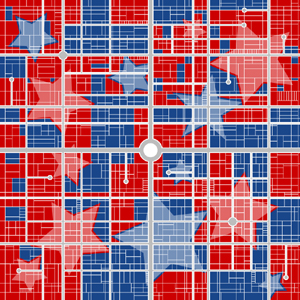Can racially gerrymandered legislature propose constitutional changes? Maybe not, court says

Image from Shutterstock.
The North Carolina Supreme Court ruled earlier this month that the state’s racially gerrymandered legislature may not have authority to propose constitutional ballot initiatives that immunize lawmakers from democratic accountability or perpetuate discrimination.
The North Carolina Supreme Court ruled Aug. 19 in a “novel” challenge to two constitutional ballot amendments. One required a photo ID to vote. The other lowered the state income-tax cap so as to bar higher graduated tax rates on higher-income taxpayers.
The lawsuit filed by the North Carolina State Conference of the NAACP contended that the unconstitutional gerrymander tainted the three-fifths supermajority vote needed to place the measures on the ballot.
Voters approved both constitutional amendments.
The legislature proposed the amendments in 2018, after a court decision determined that 28 legislative districts were drawn in a manner the violated the equal protection clause, according to the North Carolina Supreme Court’s opinion. In the general election that followed, neither political party gained a three-fifths supermajority.
The NAACP characterized the legislators elected from unconstitutionally racially gerrymandered districts as usurpers. The state supreme court said the legislature did not entirely lack authority to exercise legislative powers, and their ordinary legislative enactments should be shielded from attack.
But the state high court said the North Carolina Constitution imposes limits on lawmakers’ authority to initiate the constitutional amendment process in some circumstances. On remand, the state supreme court said, the trial judge should consider whether to invalidate the constitutional amendments after “balancing the equities” of the situation.
The state supreme court said the trial court should consider whether each challenged amendment would:
1. Immunize legislators elected because of unconstitutional racial gerrymandering from democratic accountability going forward.
2. Perpetuate the continued exclusion of a category of voters from the democratic process.
3. Constitute intentional discrimination against the same category of voters discriminated against in the process that produced unconstitutionally gerrymandered districts.
“Given the risk of confusion that may arise when a court retroactively examines a constitutional amendment that has recently been approved by a majority of North Carolina voters, a constitutional amendment enacted by a legislature composed of unconstitutionally elected members should only be invalidated when the threat to popular sovereignty and democratic self-rule is substantial,” the state supreme court said.
North Carolina Supreme Court Justice Anita Earls wrote the majority opinion. Three justices on the seven-member court dissented.
The NAACP was represented by the Southern Environmental Law Center and Justice Forward, according to an Aug. 19 press release.
The News & Observer had coverage of the decision, while Brandon Hasbrouck, a professor at the Washington and Lee University School of Law, wrote about the case in the Boston Globe.
The case is NAACP v. Moore.



